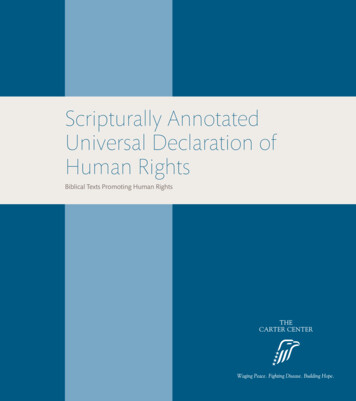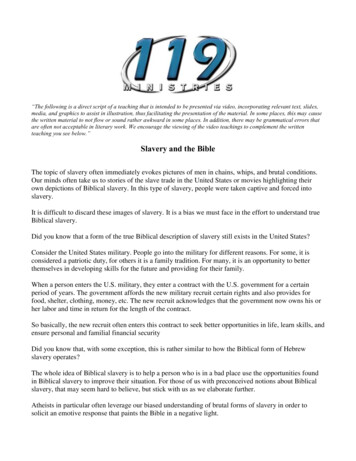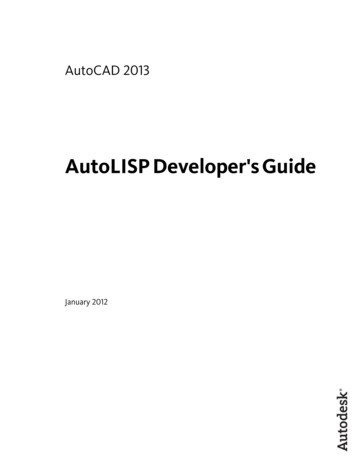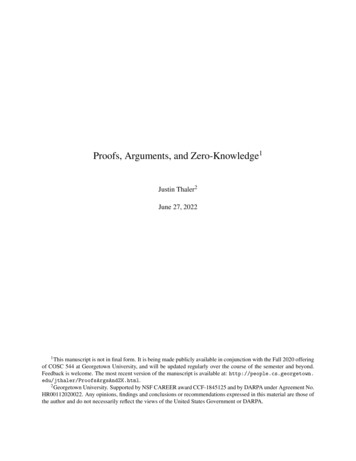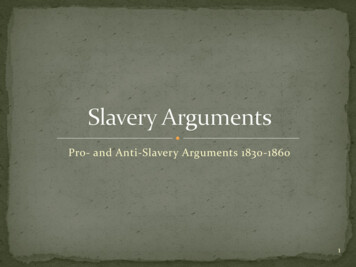
Transcription
Pro- and Anti-Slavery Arguments 1830-18601
2
The 1840s saw the continuing debate over theissue of slavery. This debate ushered in an era of politicizationover the heated topic with the creation of severalpolitical parties and the proposal of slaveryrelated legislation. The political debate over slavery centeredaround the newly acquired territories-shouldslavery be permitted in the new territories? The country's politicians were divided over theissue with both sides fervently defending theirstance.3
Anti-slavery organizations had existed in America for some time, yet until the 1840's such organizations were not politicalby nature.This was to change in 1840 with the creation of the LibertyParty.Born out of a discontent with the famed abolitionistorganization, the American Anti-Slavery Society, the LibertyParty was determined to fight slavery through political means.Participating in presidential elections in both 1840 and 1844,the Liberty Party prominently placed the issue of slavery in thenew territories in the forefront of American politics.The following document contains an excerpt from the LibertyParty Platform of 1844."Resolved, That the party . will demand the absolute andunqualified divorce of the General Government from slavery,and also the restoration of equality of rights, among men, inevery State where the party exists, or may exist."4
The expansion of the American territories grew considerablyafter the War with Mexico. Concerned with ensuring prohibition of slavery in the newlyacquired territories, David Wilmot, a politician fromPennsylvania proposed before Congress the Wilmot Proviso. This provision called for a prohibition in the territoriesrecently acquired from Mexico. While the Wilmot Provisowas passed by the House in 1846, it was rejected by theSenate. "Provided that, as an express and fundamental condition tothe acquisition of any territory from the Republic of Mexico bythe United States, by virtue of any treaty which may benegotiated between them, and to the use by the Executive ofthe moneys herein appropriated, neither slavery norinvoluntary servitude shall ever exist in any part of saidterritory, except for crime, whereof the party shall first be dulyconvicted"5
Daniel Webster, U.S. Senatorfrom Massachusetts, alsospearheaded a movementagainst slavery in Congress. In 1848, Webster, discomfortedby the idea of slavery extendinginto the new territories, issued astatement before the Senate inwhich he claimed that slaverylaws, while legally binding inthe states in which they wereenacted, are merely local lawsand have no bearing or legalityin the new territories. In this way, Webster hoped torally others behind hisessentially legal argument."It is a peculiar system of personalSlavery, by which the person who is called'Slave'. I am not at the present momentaware of any place on the globe in whichthis property of man in a human being,as a slave transferable as a chattel,exists, except America."6
While successful as the firstentirely anti-slavery political party,the Liberty Party lost both the 1840and the 1844 elections. Determined to rally more people totheir cause, the Liberty Partyjoined forces in 1848 with antislavery Democrats and ConscienceWhigs to form a new politicalparty, the Free Soil Party. The new party pushed strongly forthe abolition of slavery in the newterritories, rather than advocatingfor a general abolition of slaverythroughout the country.7
The pro-slavery political argument, like theanti-slavery argument, was essentially a legaland territorial one. Concerned with the new territories, proslavery political leaders pushed forlegislation which would permit slavery insaid territories. Focusing their argument on the rights ofslave-holders to transfer their "property" (inother words, their slaves), to the newterritories, the debates were heated. Such arguments were born out of earlierpolitical thought, provided largely by theinfluential Senator from South Carolina,John Calhoun.8
The anti-slavery political sentiment growing within Congress was a cause for alarm amongst the pro-slavery political figures, particularlythe Southern Democrats.Southerners were especially enraged with the growing abolitionistsentiment embodied in the Wilmot Proviso.In reaction, the outspoken and Senator from South Carolina, JohnCalhoun issued his "Southern Address".The address, in defense of slavery, calls for a uniting of the southernstates in order to defend what Calhoun deemed their "right" to ownslaves.The address seems to indicate that Calhoun, representing Southerninterests, viewed the southern slave states as the actual victims of thenorthern abolitionists. Calhoun claimed the Provisounconstitutional, ushering in debate concerning theconstitutionality of anti-slavery laws in the new territories.9
Pro-slavery political debates duringthis time were led largely by anoutspoken Senator from Illinois,Stephen Douglas. Douglas, like his colleagues, viewedthe question from a geographicaland territorial standpoint. Theissue, argued Douglas, was one thatshould ultimately be decided by thepeople within that particular region,and not an issue to be decided byCongress. This notion, coined "popularsovereignty" placed slavery into thehands of the residents of the newterritories.10
Economic debates over slavery abounded during the 1840's.As abolitionist sentiment grew, much attention began to befocused on whether slavery was beneficial or detrimental tothe American economy. The argument was based largely on the concept of freeversus slave labor. Free labor, argued anti-slavery groups, would be moreeconomically sound in that it would encouragecompetition and foreign investment, as well as acting as alure for immigrants. Slave labor, countered the pro-slavery groups, was the cruxof the American economy, and without it, the economy waslikely doomed to failure11
The anti-slavery economic debate largely centeredaround the notion that slavery was actually adetriment to the economy of Southern states. In this way, slavery discouraged competition and didnot allow for free and open trade with northern, antislavery states and businesses. Hinton Rowan Helper, a southern writer disparagedthe institution of slavery in the south in his bookentitled "The Impending Crisis of the South". In the book, Helper argues that the South needabolish the practice of slavery in order to further theeconomy of the southern states.12
The pro-slavery economic argument focused on the criticism of free labor.Free labor, slavery advocates argued, resulted in high costs,costs farmers would not be able to afford.A notable proponent of slavery from an economic standpointwas Edmund Ruffin, a farmer from Virginia.In his work entitled "Slavery and Free Labor Described andCompared", Ruffin concedes the long-term benefits of freelabor, yet insists that the immediate shock would be toomuch for farmers to bear.Thus, the transition from slave to free labor would not beworth the initial impact it would cast on the economy.13
Religious arguments against and for the institutionof slavery have existed for some time. Questions concerning the morality of slavery haveplagued many an American; the undercurrent ofevery slavery debate seems to actually be centeredon the moral ramifications of the institution. The following sections are devoted to the oftensensitive discussion of religious arguments for andagainst slavery.14
The pro-slavery religious position is mired in biblicalinterpretation which proponents see as a defense for theforced servitude of fellow human beings. While biblical interpretation has long been debated, thepro-slavery position asserted that because the ChristianBible lacked a clear and concise admonition against slavery,the institution was surely deemed appropriate. Advocates also argued based on precedence; ancientbiblical texts contained passages in which religious leadersin antiquity owned slaves, thus contemporary forcedservitude was deemed acceptable.15
The following document provides excerpts from a sermon given byGeorge Freeman, a Protestant minister and pro-slavery advocate. Thewords used by Freeman offer insight into the argument used byreligious leaders to advocate for slavery."Slavery, it appears, is of great antiquity. It has existed in the world, in someform or other, even from the times immediately following, if not before the flood.It may be regarded as one of the penal consequences of sin--an effect of thatdoom pronounced upon the human race in consequence of the disobedience ofour first parents, whereby perpetual labour was entailed upon man as the onlymeans of sustaining life--"Cursed is the ground for thy sake; in sorrow shalt thoueat of it all the days of thy life. In the swat of thy face shalt thou eat bread tillthou return unto the ground.""To such a state of things had the world advanced long before the establishmentof the Mosaic Institutions. Subordination in society existed everywhere.Servitude was recognized as a necessary condition, and patiently, if notcheerfully, submitted to, in every variety of form. Patriarchs, or heads offamilies, held in subjection to their authority, not only the inferior branches oftheir respective tribes, together with their hired labourers and menials, but alsoservants "bought with their money," or "born in their houses"--that is, slaves.*(See Genesis xiv. 24, 25--svi. 6,90--xvii. 12. 13.)"16
The next document provided comes from an essay by Thornton Stringfellowcalled "A Brief Examination of Scripture Testimony on the Institution ofSlavery". Stringfellow, a Baptist pastor from Virginia, provided in his essay actualscriptural reference to what he perceived to be God's approval of slavery. The excerpts below also provide insight into the commonly used religiousargument as to the "Christian mercy" bestowed on slaves by their slave-holders. Slavery, the argument goes, provided the Africans forced into America withexposure to Christianity. In this way, Christian slave-holders were saving thesouls of their slaves."All the ancient Jewish writers of note, and Christian commentators agree, thatby the "souls they had gotten in Haran," as our translators render it, are meanttheir slaves, or those persons they had bought with their money in Haran. In afew years after their arrival in Canaan, Lot with all he had was taken captive. Sosoon as Abraham heard it, he armed three hundred and eighteen slaves thatwere born in his house, and retook him. How great must have been the entireslave family, to produce at this period of Abraham's life, such a number of youngslaves able to bear arms. Gen. xiv. 14."17
Protestant dissent to the institution of slavery came to prominence after the Second Great Awakening.This Protestant revival, while not exclusively anti-slavery by nature, didact as a catalyst for many anti-slavery Protestant voices to emerge.One such advocate of abolition was William Wilson, Chancellor of theProtestant University of the United States.Wilson, in the "The Great American Question", calls for an abolitionistmovement to take the 1848 election, thus cleverly linking politics andreligion.Claiming that "slavery is irreconcilably at war", Wilson calls on his fellowProtestants to practice the basic tenets of their Christian faith.Slavery, argued Wilson, goes directly against all that is taught in theChristian Bible.18
"An Anti-Slavery Manual",published in 1851 and written byJohn Fee, admonishes theinstitution of slavery, yetprovides a slightly differentreligious argument. Fee, the son of slave-holders,argues against slavery in termsof sin. Like Wilson, Fee felt that slaverywas an affront to Christianity,yet asserted that slave-holdersneed abolish the institution ofslavery for fear for their souls. Hell awaits those that do notrenounce slavery, an argumentused by many fundamentalswithin the Christian faith.19
The women's movement at this time wasbeginning to grow in prominence. Often partnered with the anti-slaverymovement, the women's movementshared many tenets with abolitionists. Basic human rights and the notions ofequality and equity were expounded, andmany of the most famous figures of thewomen's movement were outspokenabolitionists. Elizabeth Cady Stanton, outspoken socialactivist and framer of the famed"Declaration of Sentiments", issued at theSeneca Falls Women's Rights Conferencein 1848 was one such abolitionist wholinked the anti-slavery and women'smovement.20
Lucretia Mott, another outspokenabolitionist within the women's movementaddressed many groups, forging aconnection between the women's movementand the anti-slavery movement. The connection, asserted Mott, centeredaround the subjugation of both women andAfricans by the white man, a subjugationthat was both unfair and immoral. In 1849, Mott addressed a group of medicalstudents. The sermon, poorly received bymany in the audience, espoused the need forthe abolition of slavery. Mott reminded her listeners of theirresponsibilities as care-givers, admonishingthose medical-providers who refuse serviceto Africans. Slavery, like the poor treatmentof women, argued Mott, was immoral and itwas up to the new generation to combat theevil.21
The anti-slavery debate consisted of manyelements, none more compelling than thearguments provided by former slaves. Former slaves provided realistic accounts ofthe institution of slavery by shedding lighton the plight of those bound to servitude. Henry Highland Garnet, a former slavefrom Maryland who escaped toPennsylvania in 1824 went on to receive aneducation and began work as a pastor inNew York. Garnet was an outspoken abolitionist andorator who delivered moving speeches onthe inhumanity of slavery.22
William Wells Brown, a former slavefrom Kentucky, was a prolific writerand abolitionist as well. The preface from Brown'smonumental "Narrative of WilliamW. Brown, a Fugitive Slave", writtenby J.C. Hathaway, expounds the antislavery views of Brown. Slavery, argues the author, was adisreputable institution and shouldbe immediately abolished, based onthe very nature of forced labor. Brown's work describes an extremelydifficult life, illuminating for thecountry the corrupt nature of slavery.23
Perhaps the most well-known of all formerslave abolitionists was Frederick Douglass. A former slave from Maryland, Douglassescaped from slavery to become possiblythe most famous writer and orator in thecause of abolition. In a letter to William Lloyd Garrison of theAmerican Anti-Slavery Society, Douglassdescribes his visit to England. The letterdisplays an interesting argument; thetreatment Douglass received in Englandbecame a model for how Americanattitudes need evolve. The primary argument provided byDouglass was that slavery was inhumane24
The pro-slavery political argument, like the anti-slavery argument, was essentially a legal and territorial one. Concerned with the new territories, pro-slavery political leaders pushed for legislation which would permit slavery in said territories. Focusing their argument on the
